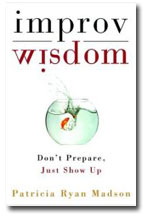Books |
Improv Wisdom: Don’t Prepare, Just Show Up
Patricia Ryan Madson
By
Published: Feb 01, 2017
Category:
Drama
Mike Nichols said — and who’d know better? — that his improvisational comedy work with Elaine May was the biggest key to his success. It was useful for him as an actor, he explained, because it reminded him that he was responsible for taking care of an audience. “But what I really thought it was useful for was directing,” he said, “because it also teaches you what a scene is made of — you know, what needs to happen. See, I think the audience asks the question, ‘Why are you telling me this?’ And improvisation teaches you that you MUST answer it. There must be a specific answer. It also teaches you when the beginning is over and it’s time for the middle, and when you’ve had enough middle and it’s time for the end. And those are all very useful things in directing.”
That knowledge is even more useful in life.
I have no interest in improvisational theater. I doubt you do. But if I step back just a bit — if I look at my life like a play — these 148 pages offer more in the way of genuine self-help advice than any self-help book I can think of.
“Don’t prepare, just show up.” That’s the book’s message. Its radical message, because we have been so trained to plan and script and PowerPoint that the last thing to occur to us is just to dive in and make it up as we go.
Patricia Ryan Madson, a professor emerta at Stanford University, used to be just like us. She had a career path. She did things that were “good” for advancement. She won awards. She got her dream teaching job.
Then her life fell apart. Her teaching “lacked intellectual distinction.” She didn’t get tenure.
How could this be? She’d been a good girl, she’d done everything right. Except, perhaps, one thing: She’d never done anything for its own sake, never taken a detour for the hell of it, never showed she was different from all the middle-level talents who grind out second-tier careers.
Madson got the message. She took up drumming, just because. Spent summers dancing and traveling. Studied Eastern religion. And, two years later, was asked to head Stanford’s undergraduate acting program. She spent the rest of her career there, winning the university’s highest teaching prize — though she might say the crowning achievement of her decades in Palo Alto was the founding of a theatrical group, the Stanford Improvisers. [To buy “Improv Wisdom” from Amazon, click here. For the Kindle edition, click here.]
Improvising, she emphasizes, has “nothing to do with wit, glibness or comic ability.” It is simply about saying “yes” to what is in front of you. And, therefore, you can learn how to do it — how to listen, plan just enough, follow the plan but not religiously, and then trust yourself to get to a good place through improvisation.
It all starts with “yes.” Are you prepared? No? Worry not. You’re fine. Indeed, spend a day without planning — see if it ends badly. Nervous about being out on a limb? Good! The only time you should really feel confident is after you’ve succeeded, and then you’ll gain a new set of concerns. Worried that you won’t succeed? Lower the bar. Mistakes? They’re often “results that we had not planned.”
Along the way, Madson offers advice that seems to have nothing to do with theater. And it doesn’t. It’m much more important than theater. “Make a point of thanking people for thankless jobs.” Write a thank-you note every day. Be a guardian angel to one person. Why? So you can be more awake, more attentive, more in the stream of life.
PISCES MORTUI SOLUM CUM FLUMINE NATANT. That’s an inscription Madson saw over a Welch bar. Translation: “Only dead fish go with the flow.” Now that’s a warning you won’t forget.
It’s not, however, a cue to micromanage your life. It is an instruction to take charge — but “taking charge” has no link to control or power. It’s just about engagement, creative engagement.
Maybe this is a good time for you to get interested in improvisational theater.


